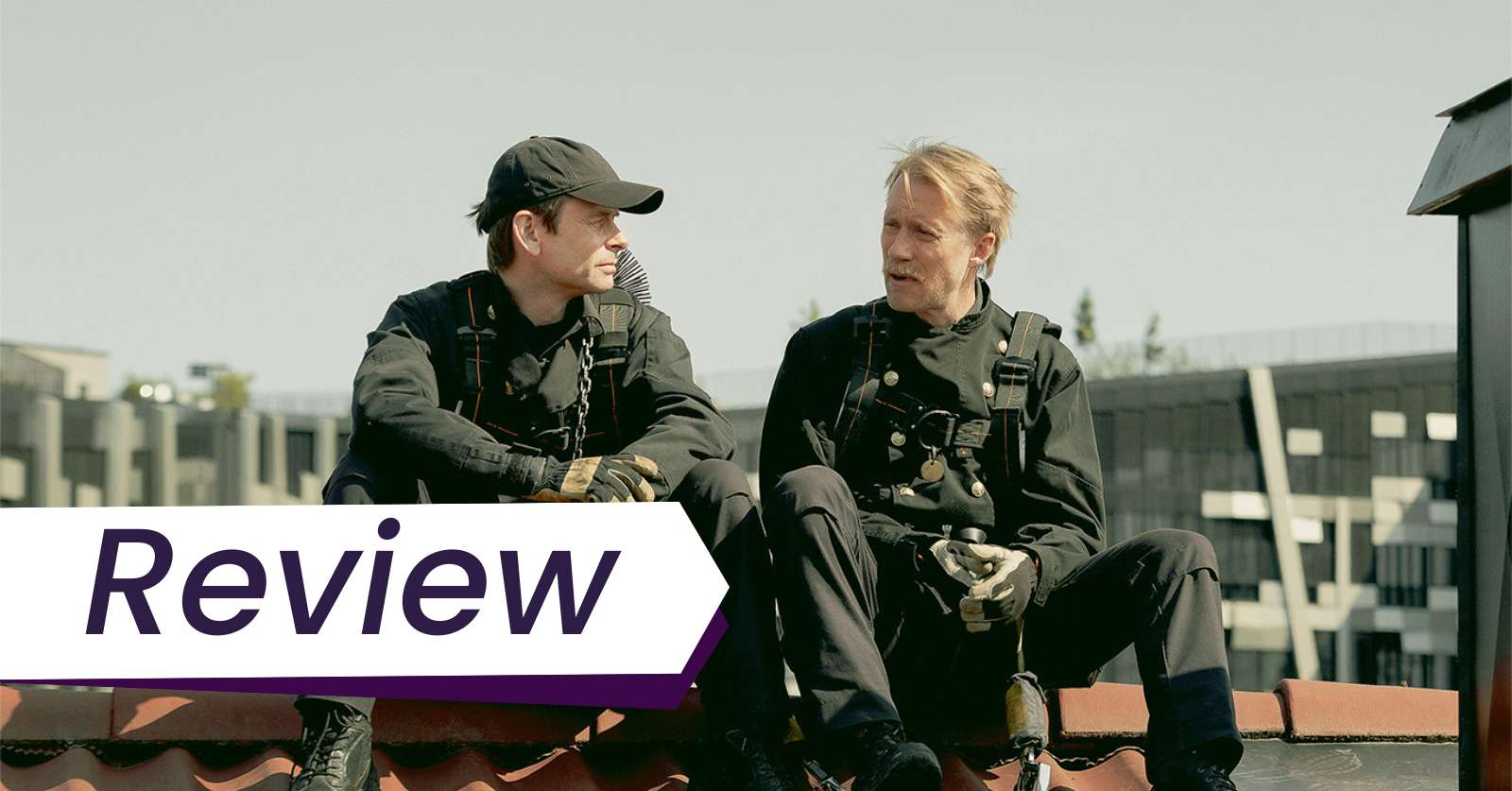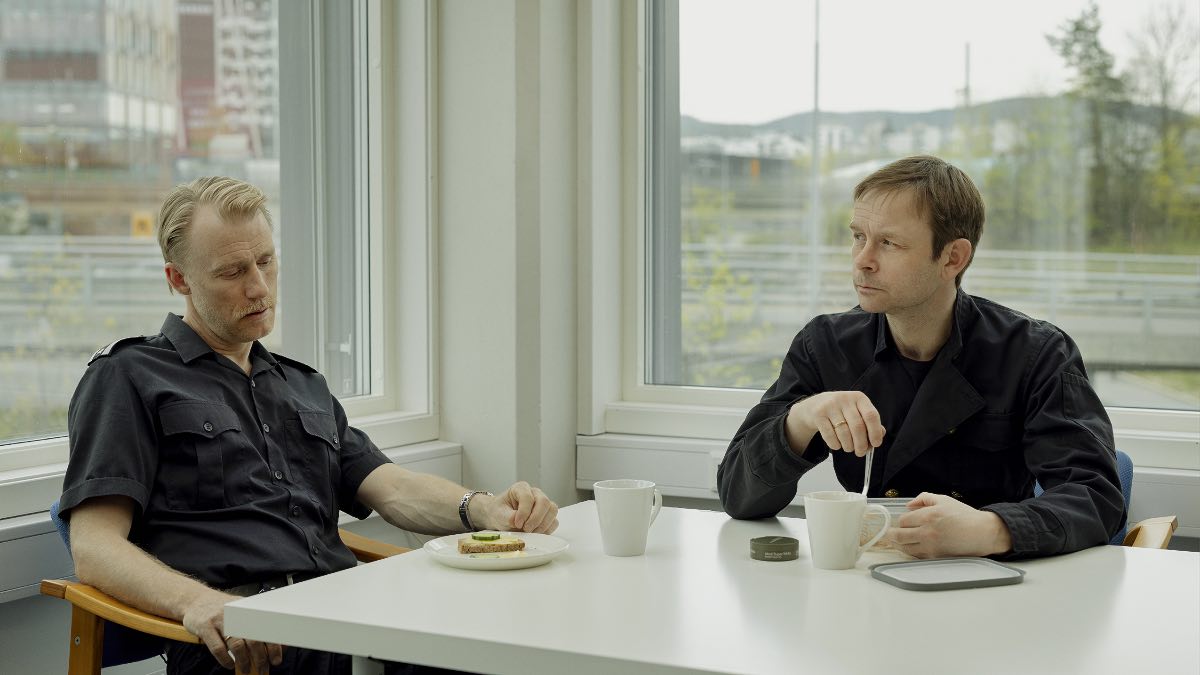In queer filmmaker Dag Johan Haugerud’s film Sex, two nameless middle-aged white men, both straight-married chimney sweeps, grapple with their views on gender roles and sexual identity in contemporary Oslo. Haugerud’s film Sex screens in the Panorama section at the 2024 Berlinale.
Discover more great films from the Berlinale.

Discover one film you didn’t know you needed:
Not in the zeitgeist. Not pushed by streamers.
But still easy to find — and worth sitting with.
And a guide to help you do just that.
In queer filmmaker Dag Johan Haugerud’s film Sex, two nameless middle-aged white men, both straight-married chimney sweeps, grapple with their views on gender roles and sexual identity in contemporary Oslo. One of the men (Thorbjørn Harr) doesn’t know how to react to a recent dream he had in which Bowie looked at him “as if [he] were a woman,” or perhaps, as he later clarifies, as someone he doesn’t recognize. His friend (Jan Gunna Røise), meanwhile, had sex with a man for the first time the previous night, an unexpected but surprisingly wonderful experience, which gets tarnished as soon as he tells his wife about it. They are a happily married monogamous couple with two children and have been together for twenty years. He seems to identify as straight, so his sexual encounter with a man comes as a massive shock to both of them.
Both men spend the film dealing with the fallout of these experiences. The dream unsettles how Thorbjørn perceives himself, convinced that his voice has become higher and thus more female-coded, though his family notes no difference. Jan copes with his wife’s intense emotional reaction to an event that he sees as an unexpected blip. Jan’s is the more successful story, while Thorbjørn’s seems to fall back on cliches that the film can’t entirely explore because Thorbjørn himself doesn’t know how to recognize the heteronomative standards he’s judging himself by. He never encounters anyone with a different or more informed perspective who can help challenge or shape his ideas.
Dan Johan Haugerud’s mise en scène in a key early scene in his film Berlinale film Sex

The way Haugerud films the scene where both men share these unexpected experiences is instructive about Haugerud’s aesthetic approach and how we should read the rest of the film. Thorbjørn worries about how others will perceive him and how his perception of himself changes because of the dream. He tells most of his story in a single uncut medium shot, where a large window behind him covers the screen, making it feel like the world is peering in on him, judging him for what he’s saying. We see cars driving by in the background and Jan in a blurred reflection.
The film is also about how the men’s perspectives on themselves shift because of these events and how their family reacts to them. Consequently, the first cut in the scene happens when Jan responds with his story about sex with a man. Haugerud shifts the camera over 45 degrees so that the men face each other (at right angles) in a two-shot, visually shifting our perspective.
Jan tells his wife
The conversations that follow reshape how the men interpret the events. When Jan first tells Thorbjørn he had sex with a man, he’s calm, not shaken, but he remembers the experience fondly as a beautiful surprise. As soon as his wife responds to the news, he becomes crestfallen because his actions hurt her, and she can’t get past it. She starts assuming it means negative things that it doesn’t. In two scenes, each long, uncut two shots, she makes it all about her, making us feel as trapped by this conversation as Jan does.
There’s nothing he can say to make things better because his wife sounds like she’s reading off a script of the rules of heteronormativity rather than considering what her actual husband is saying about this particular experience. She assumes the sex was intimate, that Jan must want to have sex with more men, and that there must be a problem in their marriage to have precipitated this. It feels like she responds the way she feels she should rather than considering her actual husband and the specific situation. From Jan’s perspective, and frankly, the perspective of anyone somewhat conversant in queer cinema or queer culture, she’s making a mountain out of a molehill.
Queer cinema has long been telling stories about the relationship between sex, intimacy, and commitment
For decades, queer cinema has been telling stories about how sex, intimacy, and commitment aren’t always intertwined. There can be sex without intimacy, intimacy without commitment, and not-at-all intimate sex. In the second episode of Looking, the boys debate this very topic. In End of the Century, we see sex in the same relationship that starts as a one-off hookup, relatively impersonal but hot and transforms into a long-term committed relationship, where the sex is hugely intimate if slightly more rote. Last year’s Berlinale screened queer filmmaker Ira Sachs’s Passages, in which Tomasz (Franz Rogowski) comes home to his husband (Ben Whishaw) one day and declares he just had sex with a woman for the first time and enjoyed it, expecting his husband to share in the joy.
What Haugerud does in Sex is thus hackneyed from a queer cinema perspective and yet groundbreaking for straight cinema. Casual straight sex is rarely on film depicted as fulfilling in itself, aside from perhaps orgasmically. Casual sexual relationships in films are almost always a thing to be discarded when the characters become mature enough to find more. Or they’re a starting point for characters falling in love but lying to themselves about their feelings. A man stepping outside his marriage to a woman to have casual sex with another woman, a source of tension in Before Midnight, is further fraught with patriarchal norms.
Jan doesn’t see his sexual liaison as life-changing in Dag Johan Haugerud’s Berlinale film Sex
In most films, when a man steps outside of his straight marriage for another man, it often precipitates the end of the marriage because he realizes he’s gay (e.g., Giant Little Ones). Sex is thus surprisingly radical because straight-married Jan has sex with a man and doesn’t see any reason why this needs to change his relationship. The only sources of tension are his wife’s heteronormative expectations, which make him feel crappy about this lovely experience and perhaps overreact. It’s an understandable response, but they’ve built a relationship on years of shared lives and a family with children. She’s almost ready to throw it away over an encounter that he saw as a surprising curiosity more than anything life-changing.
Jan’s choice to have this sexual experience with a man perhaps speaks less to his sexuality and more to his ideas about sex and relationships, which don’t necessarily jibe with his wife’s. Their discussions reveal the pair are poor at communicating their thoughts and feelings about sex, even though they claim to talk about it all the time. More importantly, they seem to have different interpretations of what it means to be a long-term committed couple and what counts as an irreparable break of trust. As Thorbjørn points out in the first scene, Jan is naive to think his wife would be as blazé about it as he is.
The characters are too inarticulate about their feelings to have productive conversations in Dan Johan Haugerud’s film Sex
They’re both so inarticulate about their feelings around the situation, perhaps lacking the language and tools to discuss it, so things stay relatively surface level as they try to fit their circumstances into their heteronormative understanding of the world. I appreciate Haugerud’s refusal to force Jan to put a label on the experience when he may not yet be ready to define it. But there’s only so far a story can go about two confused people who don’t know how to communicate without bringing in outside perspectives to help them sort through. Offscreen, Jan’s wife talks to some friends about what’s happening, but their views are even more rigid than hers.
Her response and her entrenched ideas about sex and marriage are very much of a particular generation — essentially, people over forty — while the younger generations grew up in a world that was a bit less rigid in their ideas about sexuality and gender. Haugerud gestures toward this in Thorbjørn’s story. While Thorbjørn questions whether his newly higher-pitched voice threatens his masculinity, his early adolescent son sews a tunic costume for Jan’s upcoming choir concert. There was a time, likely when Thorbjørn was growing up, when a boy who sews would have been denigrated as effeminate. It wouldn’t occur to Thorbjørn or his wife to think that about their son, but what we learn when we’re young can be hard to shake. Haugerud thus reminds us that the challenges in dealing with Thorbjørn’s dream and Jan’s sexual encounters are rooted in somewhat old-fashioned ideas.
Why tell this story about straight people for straight people?
Where I struggle, though, is what is the value of treating behaviour that isn’t heteronormative as a big deal we should examine in the context of a film when this is well-trodden territory for queer cinema? Depressingly, one reason is that, as Glen in Weekend (2011) suggested, straight people just won’t see queer films. Though that’s less true now than in 2011, it’s still a barrier. More importantly, it’s helpful to have a film about your experience rather than an adjacent experience that you don’t have to translate for your own. (Of course, it’s usually queer people who have to translate from straight stories.)
Considering how much silence there is among straight people about the possibility of not following heteronormative expectations, that’s a win. But if the goal is to open conversations about these issues among the straight-identifying majority, the film’s (excellent but distancing) formal aesthetic choices, which put it in arthouse territory, may pose a challenge. Internationally, it’s already limited to people who will watch a film with subtitles. And I’m not sure how to feel about it since, as a fan of queer cinema, the film doesn’t feel to me to be as perspective-shifting as Haugerud thinks it is.
Related reading/listening to Dag Johan Haugerud’s film Sex
More LGBTQ films: Read our Special Issue on Andrew Haigh’s Weekend (2011) for its 10th anniversary. Listen to our podcast on Weekend and End of the Century and our podcast on Looking HBO. Read all of our LGBTQ film coverage.
More Norwegian films we love also produced by Motlys, which made Dag Johan Haugerud’s Berlinale film Sex. Read our Special Issue on their Joachim Trier film Oslo, August 31st (2011) and listen to the podcast. We loved Maria Søhdal’s Oscar-shortlisted Hope. Read our interview with the directors and stars of Hope, read our film review, and listen to our podcast on the film. Motlys also produced Joachim Trier’s Thelma (2017) and Louder Than Bombs (2015). Read our interview with the filmmaker and star of Ninjababy. Listen to our podcast on Ninjababy.
More highlights from the Berlinale’s Panorama section: Read our interviews with the filmmakers behind North by Current (2021), Miguel’s War (2021), Night Raiders (2021), and Brother’s Keeper (2021). Read our reviews of Brother’s Keeper (2021) and Just Like Our Parents (2017). Listen to our podcasts featuring Panorama highlights like Lullaby (2022) and Oscar-nominee The Teachers’ Lounge (2023).
More from Berlinale 2024: Read all of our Berlinale coverage.

